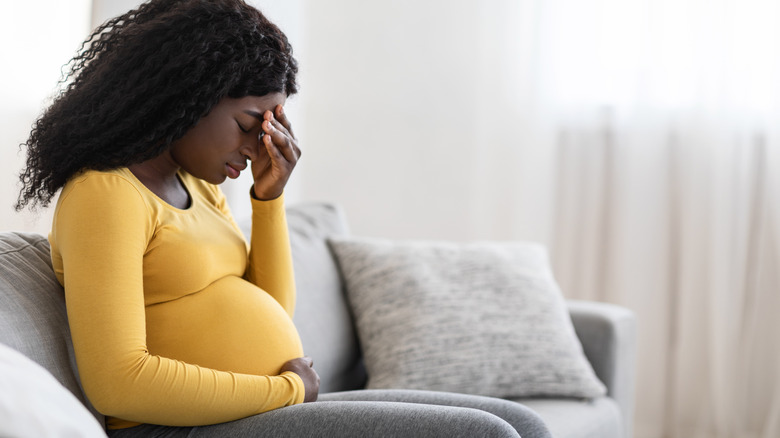For most, being pregnant means being more tired than usual. It’s not hard to understand why you might experience fatigue during pregnancy — growing a tiny human is hard work! The Mayo Clinic explains that during the first trimester, increased levels of the hormone progesterone, as well as a quickening of the metabolism, can contribute to these feelings of languidness. But despite all the reasons why their changing bodies could benefit from some extra zzz’s, many find that — during pregnancy — sleep is harder to come by.
Whether the restlessness stems from normal pregnancy symptoms that get in the way of quality sleep or sleep disorders exacerbated by pregnancy, at least 50% of pregnant women experience insomnia. Let’s take a closer look at the common sleeping issues that plague pregnant women and the best practices for getting a good night’s sleep with a bun in the oven.
What causes sleep distrubances during pregnancy?

During pregnancy, there’s no shortage of pesky symptoms that can cause sleep disturbances. Nausea and vomiting associated with morning sickness, shortness of breath, increased urination, elevated body temperature, breast tenderness, and leg cramping are common culprits of sleep disturbances.
As the pregnancy progresses, issues like back pain, difficulty getting comfortable, and anxiety about impending motherhood may occur, which may keep you tossing and turning all night long. Some women even experience vivid nightmares during the third trimester.
As if that’s not enough to contend with, the incidence of certain sleep disorders increases during pregnancy. Obstructive Sleep Apnea (OSA) — a condition marked by snoring and disrupted breathing patterns during sleep — occurs in 1 out of 5 pregnant women as a result of weight gain (per Sleep Foundation). Another 1 in 3 women experience Restless Leg Syndrome during the third trimester, and nearly half of all pregnant women have gastroesophageal reflux disorder — or heartburn — keeping them awake during the third trimester.
How to get a better nights sleep during pregnancy

Getting quality sleep is important for the health of both mom and baby. Without it, moms-to-be might find that mood, cognition, appetite, and immunity suffers. It’s particularly important to avoid prolonged sleep deprivation during pregnancy as it could lead to high blood pressure in the third trimester, which raises the risk of preeclampsia (per Sleep Foundation). For that reason, sleep disorders like OSA and heartburn may be addressed through the use of a continuous positive airway pressure (CPAP) device and antacids, respectively.
Even without pregnancy-related sleep disorders, regular pregnancy symptoms have a way of making sleep hard to come by. To combat frequent nighttime urination, you can increase your water intake during the day so you can stop drinking water a couple of hours before bedtime. To ensure leg cramps don’t keep you up at night, you might try engaging in moderate daily exercise to increase circulation. And for those who toss and turn because of stress, a relaxing bedtime routine with a cup of herbal tea and a warm shower can help you wind down. Women past 20 weeks of gestation are also encouraged to sleep on their side. To make this more comfortable with your growing bump, try using pillows to support your knees and belly.



